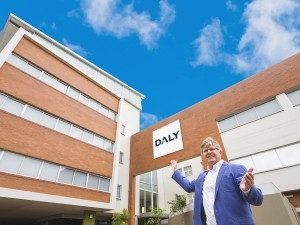Johannesburg, 04 May 2017

After 17 years in the collections contact centre business, Daly Credit Corporation and its associate companies are moving to new and bigger premises.
The transition of the business, which currently operates from two separate premises in Mount Edgecombe, will be effected on a staged basis over a period of three months, starting in May 2017. The move to the company's new 7 100m2 Daly Group Building, in Mount Edgecombe, will be the third move in the history of the business and represents an exciting milestone in its journey.
In 2001, Daly Credit Corporation commenced trading in Durban as attorneys RL Daly, with Daly Credit Corporation providing the infrastructural support in terms of premises and technology, and with a staff complement of 20. In 2002, it relocated from Durban to shared premises in Mount Edgecombe, and in 2008, the company moved to its current 2 500m2 contact centre premises with approximately 120 staff.
Today, Daly Credit Corporation has over 500 employees and services most of the banks, retailers and other credit providing companies in South Africa, collecting in excess of R380 million per annum. Daly Credit Corporation is also an international member of the Credit Services Association (CSA) in the UK and regularly attends CSA credit conventions in the UK in order to keep abreast of global trends and opportunities in the international credit industry.
Since 2001, there has been massive change in the credit industry both globally and in South Africa. In 2008, we saw the global collapse of the banking industries in the USA and UK, which led to the bail-out of the banks by government (tax payers), quantitative easing (printing money) and the subsequent credit control regulations and creation of bodies such as the Financial Conduct Authority (FCA) in the UK, with special emphasis on "know your customer" and "treating customers fairly".
Although not affected to the same extent, the global impact of the meltdown affected our economy and in particular, the cost of living and the debt to disposable income ratio of the average consumer. Notwithstanding the passing of the National Credit Act in 2007 and other consumer protection laws intended to curb reckless lending, many credit providers continued to lend without restraint. This gave rise to a number of questionable and unlawful collection practices (garnishee orders) which were really only outlawed in 2016 with the "Stellenbosch" case and the subsequent changes to legislation. A classic case of "too little too late", as today, almost 45% of our population, according to the NCR stats, are credit active with more than 50% being over-indebted.
How did this happen? Consumer credit really started back in 1994 when SA moved from being a "cash save" to a "credit spend" society and when the banks and other financial institutions came under pressure to "bank" the previously "unbanked". This gave rise to the micro-lending industry and other forms of retail consumer credit on a massive scale. While credit was seen as a way to help average South Africans improve their standards of living, the dark side of credit (debt) was not fully understood by the majority of consumers, resulting in over 10 million consumers being over indebted.
So, what is the future of credit in South Africa and the industry? Until we are able to grow our economy and increase formal employment, it is safe to say that we will continue suffer a net loss of credit worthy consumers as more and more consumers default on their credit payments and fewer and fewer qualify for credit. I don't believe it is the end of the road for credit, but the landscape is going to be a lot tougher for both credit providers and debt collectors as the risks and cost of collections increase.
In order to remain relevant, Daly Credit Corporation has diversified to meet the demands and standards of its clients in regard to transformation, education, skills development, job creation, cost efficiencies, productivity, capacity and business continuity, and in so doing, has expanded the Daly group of companies to include a skills training academy, Edu Power Skills Academy, which offers learnerships leading to full-time employment; a legal logistics company, Lexecute Logistics, which offers low-cost back-office legal process administration involving over 160 correspondent attorneys and 450 sheriffs throughout South Africa; an IT infrastructure, dialler, PBX, CIC and Purecloud service provider, Safricloud; and Safricall, which provisions contact centre seats to third party organisations.
Through the aggregation of services, the Daly Group is able to offer Daly Credit Corporation, attorneys RL Daly and other enterprise development call centre businesses cost-effective services at highly competitive rates.
The company is excited and optimistic that its move to the new Daly Group building will facilitate its vision of becoming the leader in innovative, intelligent and ethical customer experience services in the debt collections industry, the skills training industry, the BPO industry and in the LPO industry, where its slogan is: "Influencing via innovation and business intelligence".
Share